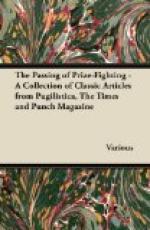* * * * *
BUCKLER’S.
To acquire an estate is, even in these days of inflated prices and competitive house-hunters, an easy matter compared with finding a name for it when it is yours. It is then that the real trouble sets in.
Take the case of my friend Buckler.
A little while ago he purchased a property, a few acres on the very top of a hill not too far from London and only half-a-mile from his present habitation, and there he is now building a home. At least the plans are done and the ground has been pegged out. “Here,” he will say, quite unmindful of the clouds emptying themselves all over us—with all an enthusiast’s disregard for others, and an enthusiast, moreover, who has his abode close by, full of changes of raiment—“here,” setting his foot firmly in the mud, “is where the dining-room will be. Here,” moving away a few yards through the slush, “is the billiard-room.” Then, pointing towards the zenith with his stick, “Above it”—here you look up into the pitiless sky as well as the deluge will permit—“are two spare rooms, one of which will be yours when you come to see us.” And so forth.
He then leads the way round the place, through brake fern wetter than waves, to indicate the position of the tennis-courts, and in course of time you are allowed to return to the dry and spend the rest of the day in borrowed clothes.
Everyone knows these Kubla Khans decreeing pleasure domes and enlarging upon them in advance of the builders, and never are they so eloquent and unmindful of rain and discomforts as when their listeners are poor and condemned to a squalid London existence for ever.
But that is beside the mark. It is the naming of these new country seats that leads to such difficulties.
That night at dinner the question arose again.
“As it is on the top of the hill,” said a gentle wistful lady, “why not call it ‘Hill Top’? I’m sure I’ve seen that name before. It is expressive and simple.”
“So simple,” said Buckler, “that my nearest neighbour has already appropriated it.”
“I suppose that would be an objection,” said the lady, and we all agreed.
“Why not,” said another guest, “call it ‘The Summit’? or, more concisely, just ’Summit’?”
“Or why not go further,” said a frivolous voice, “and suggest hospitality too—and Buckler’s hospitality is notorious—by calling it ’Summit-to-Eat’?”
Our silence was properly contemptuous of this sally.
“If you didn’t like that you might call it ‘Summit-to-Drink,’” the frivolous voice impenitently continued. “Then you would get all the Americans there too.”
The voice’s glass having been replenished (which, I fancy, was its inner purpose) we became serious again.
“As it is on the top of the hill,” said the first lady, “there will probably be a view. Why not call it, for example, ‘Bellevue’? ‘Bellevue’ is a charming word.”




